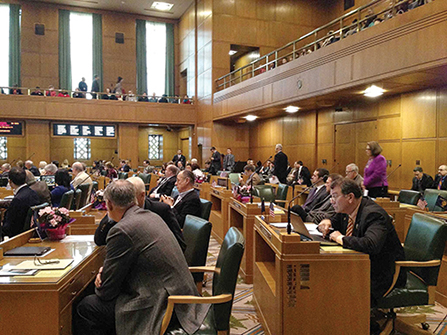If you love taxes and are looking for the government to find more ways to spend your money look no further than the new Oregon legislature.
The House Revenue Committee has introduced more than 40 bills that would increase taxes including a 50 percent cut to all itemized deductions such as home mortgages and capping mortgage interest deductions, reducing charitable giving by capping itemized deductions, eliminating supermajority requirement for tax bills, cutting the standard deduction for seniors and the blind, increasing tax on motor vehicle fuels and eliminating the individual income tax kicker.
Governor Kitzhaber’s own budget is full of spending including a nearly 11 percent state spending increase, $800 million in new government programs, taking the people’s Kicker Income Tax refund and creating the nation’s first billion dollar Carbon Tax.
If that is not enough to make you concerned a new bill would allow cities across the state to tax internet access and alcoholic beverages.
Another proposal will raise taxes on job training non-profits, rural health care facilities, pollution control facilities, TV and radio stations, housing for college students, farmland used for grazing, county fairgrounds, boats used as ferries, crab pots, Christmas trees, trees and shrubs, farm produce (even if donated to a food bank), farm machinery and small business inventory. Not any of this will improve, maintain or enhance the economy.
A final slap in the face to small business is a bill that rolls back part of the small business tax cut from the 2013 Grand Bargain, the largest tax cut for small business in Oregon history.
There are several reasons why this tax revenue building approach is incongruous to growing our economy. First, it shows a disconnect with small businesses that have only recently seen the light at the end of the tunnel after a devastating recession.
Second, the state is expected to have a surplus of revenue this coming year due to the improvement in the economy, but many legislators, instead of continuing the momentum to prosperity, want to bring back the tax and spend attitude of a few years ago and raise more revenue.
Third, according to the state’s own Office of Economic Analysis we are still not out of the woods economically. On the positive side, economists said that on the eve of the Great Recession’s seventh anniversary, the U.S. economy has regained all of its recessionary losses across a host of top line economic indicators. Employment, personal income, stock prices and GDP are all at or near record levels.
However, below the surface, not all is well with the economy the analysis says. Although aggregate measures of economic activity have bounced back, the U.S. economic recovery is not yet complete. In particular, there is still slack in the labor market, with many workers unable to land the type of job that they are aiming for given their individual skill sets. Other workers have become discouraged and have left the labor force altogether.
In Oregon, the overall number of jobs has yet to return to its prerecession peak, but will no doubt do so before the 2015-17 biennium begins. As has historically been the case, Oregon’s recession and recovery have shown more of a boom-bust cycle than what has been seen in other states. After suffering relatively severe job losses during the recession, Oregon is now experiencing above-average job growth. But Oregon’s rural communities have yet to see much
of a recovery to date. Despite recent improvement, most rural areas have just begun to repair the damage done by the recession.
A more prudent approach to budgeting for state expenditures would be to look at the wasted spending in state government (the failed Cover Oregon, the new I-5 bridge debacle, the wasteful Oregon Sustainability Center and bonuses for staff in failing department are just a few examples.) The amount of money the various state departments and the legislature wastes is mindboggling.
The delegation from Central Oregon (who didn’t draft any of these tax proposals) will have their challenges in trying to keep meaningful legislature at the forefront of the session and keep bills that increase taxes and harm the economy at bay.




